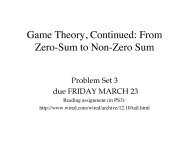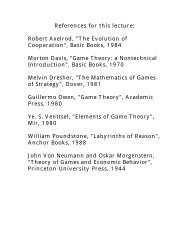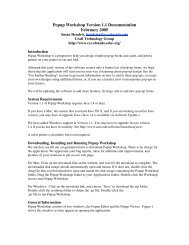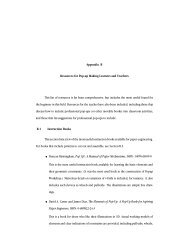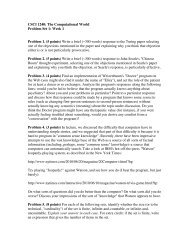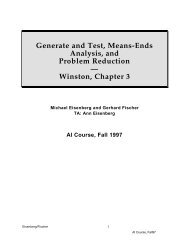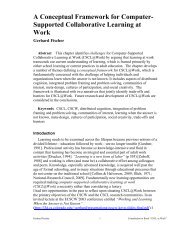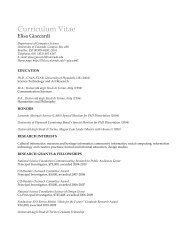Do we have access to our own mental processes? High-‐level v. low ...
Do we have access to our own mental processes? High-‐level v. low ...
Do we have access to our own mental processes? High-‐level v. low ...
You also want an ePaper? Increase the reach of your titles
YUMPU automatically turns print PDFs into web optimized ePapers that Google loves.
<strong>Do</strong> <strong>we</strong> <strong>have</strong> <strong>access</strong> <strong>to</strong> <strong>our</strong> <strong>own</strong> <strong>mental</strong><br />
<strong>processes</strong>?<br />
<strong>High</strong>-<strong>‐level</strong> v. <strong>low</strong>-<strong>‐level</strong> <strong>processes</strong>:<br />
Widespread agreement that <strong>we</strong> do not <strong>have</strong><br />
direct introspective <strong>access</strong> <strong>to</strong> the workings<br />
of <strong>low</strong>-<strong>‐level</strong> <strong>processes</strong> (perception,<br />
memory).<br />
But what about <strong>processes</strong> involved in<br />
judgment, choice, inference, and problem-‐<br />
solving?
People freely offer reports on the<br />
workings of their high-<strong>‐level</strong> <strong>mental</strong><br />
<strong>processes</strong>. Why do they do this, if they<br />
<strong>have</strong> no direct <strong>access</strong> <strong>to</strong> the high-<strong>‐level</strong><br />
<strong>processes</strong>?<br />
If the anti-‐introspectionist is correct,<br />
how could <strong>we</strong> ever get it right when <strong>we</strong><br />
report on <strong>our</strong> <strong>own</strong> high-<strong>‐level</strong> <strong>mental</strong><br />
<strong>processes</strong>?
Subjects detect a gap bet<strong>we</strong>en what<br />
they’ve done and what they <strong>have</strong><br />
justification for doing, and adjust their<br />
attitudes or beliefs about what they’ve<br />
done so as <strong>to</strong> reduce this gap.<br />
Subjects given the electric shocks with<br />
no justification performed better on<br />
the simultaneous learning task and had<br />
lo<strong>we</strong>r galvanic skin response.
Hypothesis: The subjects <strong>we</strong>re aware,<br />
on some level, that they <strong>we</strong>re accepting<br />
shocks for no good reason and so<br />
“decided” that the shocks <strong>we</strong>re not so<br />
painful after all (otherwise, why would<br />
they be accepting them?).<br />
This “decision” had concrete effects,<br />
both cognitive (their improved<br />
learning) and physiological (their skin<br />
responses).
Appears <strong>to</strong> be little correlation bet<strong>we</strong>en<br />
the verbal reports (when collected) on<br />
the internal <strong>processes</strong> and measurable<br />
results (other than verbal report).<br />
In the extreme case, subjects’ reports did<br />
not change across conditions in which<br />
there was significant behavioral change<br />
(other than the verbal report). This is<br />
what happened in the shocked-‐while-‐<br />
learning experiment.
Sometimes subjects’ reports are<br />
correlated with the relevant behavioral<br />
results (change or no change).<br />
But in some cases, subjects’ reports did<br />
not change across conditions in which<br />
there was significant behavioral change<br />
(other than the verbal report). In the<br />
shocked-‐while-‐learning experiment, the<br />
subjects with insufficient justification<br />
didn’t report feeling any less pain.
Distinguish bet<strong>we</strong>en cases in which subjects<br />
report only an attitude correlated with the<br />
measurable behavioral change<br />
and<br />
Cases in which the subjects also report that<br />
there was a change.<br />
Of the two, only the latter is evidence that the<br />
subjects <strong>we</strong>re aware of the cognitive <strong>processes</strong><br />
by which the change was effected.
Subjects report their attitudes on an issue of social<br />
or political importance, then are asked <strong>to</strong> write an<br />
essay advocating the opposing view.<br />
Some of them are given sufficient justification;<br />
some are not.<br />
Those given insufficient justification not only<br />
change their reported attitudes, but they also<br />
claim that their new attitude was the same as their<br />
original one! They seem <strong>to</strong> <strong>have</strong> no awareness of<br />
the change process. (This kind of thing occurs<br />
even when the subjects are <strong>to</strong>ld that the<br />
experimenters recorded the originally reported<br />
attitude and <strong>have</strong> the record at hand.)
Funda<strong>mental</strong> Attribution Error:<br />
jumping <strong>to</strong> the conclusion that a<br />
person’s behavior was caused by<br />
their relatively stable character or<br />
personality traits.<br />
General idea of attribution is that<br />
<strong>we</strong> attribute personality traits <strong>to</strong><br />
<strong>our</strong>selves or others as a way of<br />
explaining or interpreting<br />
individuals’ behavior.
Self-‐professed snake-‐o-‐phobes are sh<strong>own</strong> slides of<br />
snakes interspersed with slides that say ‘shock’. After<br />
every ‘shock’ slide, a shock is administered.<br />
All the while, subjects hear a sound recording of<br />
thumpings that happen <strong>to</strong> speed up when, and only<br />
when, the shock slides are sh<strong>own</strong>.<br />
Experi<strong>mental</strong> group is <strong>to</strong>ld that the thumpings are the<br />
output of a heart moni<strong>to</strong>r (control group <strong>to</strong>ld that<br />
they are simply incidental noises).<br />
Members of the experi<strong>mental</strong> group are more willing<br />
<strong>to</strong> approach snakes after conclusion of the<br />
experiment.
Members of the experi<strong>mental</strong> group seem <strong>to</strong><br />
reason that they must not really be afraid of<br />
snakes, given that their heart rate increases<br />
only when they see the ‘shock’ slides, not when<br />
they see snake slides.<br />
They then attribute the personality trait “not<br />
being afraid of snakes” <strong>to</strong> themselves, and they<br />
act accordingly.<br />
Nevertheless, there was no evidence that the<br />
experi<strong>mental</strong> subjects <strong>we</strong>re aware of this<br />
process. They verbally reported the same level<br />
of fear of snakes after the experiment as before.
Subjects exposed <strong>to</strong> a series of increasingly<br />
strong shocks.<br />
Experi<strong>mental</strong> subjects given (what is<br />
actually) a placebo pill. They <strong>we</strong>re <strong>to</strong>ld that<br />
the pill would produce “anxiety” symp<strong>to</strong>ms,<br />
i.e., the kind of physical symp<strong>to</strong>ms<br />
associated with fear of upcoming shocks.<br />
Experi<strong>mental</strong> subjects <strong>we</strong>re willing <strong>to</strong> take<br />
f<strong>our</strong> times as much amperage as control<br />
subjects.
When subjects are asked, point blank, about<br />
their reasons for taking so much more shock,<br />
they confabulate or hem and haw, but show no<br />
sign of having been aware of the role of their<br />
beliefs about the pill or the pill’s relation <strong>to</strong><br />
anxiety symp<strong>to</strong>ms.<br />
Results of the “insomniac” experiments are the<br />
same. Subjects are given open-‐ended<br />
opportunity <strong>to</strong> explain the experi<strong>mental</strong><br />
results, but show no awareness of it, and even<br />
deny that anyone would <strong>have</strong> gone through<br />
such a process (once the experiment is<br />
explained).
Helping behavior<br />
Word-‐pair association effects (third-‐person<br />
reports match introspection)<br />
Position effects<br />
Anchoring (even though it sometimes has an<br />
effect and sometimes not, subjects reported a<br />
moderate effect across the board)<br />
Personality, mannerisms, and accent
Inclusion or exclusion of passages<br />
(third-‐person reports are equally off<br />
base).<br />
Noise and focus of films.<br />
Predicted <strong>to</strong>lerance for shocks and “no<br />
permanent damage” (third-‐person<br />
results are the same).
Subjects often do not report the<br />
occurrence of the operative stimulus,<br />
do not report the effect that occurred,<br />
who are aware of the stimuli and the<br />
effect, don’t recognize that the former<br />
caused the latter,<br />
or, can’t report the cognitive<br />
processing that occurred on the way<br />
from cause <strong>to</strong> effect.
Subjects don’t want <strong>to</strong> look silly<br />
Response: But many of the experiments involve<br />
non-‐ego-‐involving subject matter or third-‐<br />
person estimates that correspond <strong>to</strong> first-‐<br />
person ones.<br />
It’s merely bad memory.<br />
Response: Perhaps, but the questions in these<br />
studies are often asked minutes or only<br />
seconds after the process in question has<br />
occurred. So, even if <strong>we</strong> <strong>have</strong> some <strong>access</strong><br />
while the process is occurring, it’s not very<br />
helpful.
Subjects are asked <strong>to</strong> tie the two ropes <strong>to</strong>gether.<br />
When they get stumped, the experimenter swings<br />
one of the ropes, which has a significant effect –<br />
giving the subjects the idea <strong>to</strong> tie a <strong>we</strong>ight <strong>to</strong> one<br />
of the ropes and swing it.<br />
Sometimes a bad cue is included (experimenter<br />
ties a <strong>we</strong>ight <strong>to</strong> a rope and twirls it).<br />
When both cues are included and subjects are<br />
asked which one did the trick, they choose the<br />
wrong one, but the one that might be implied by<br />
an everyday “theory” of how minds work.
When reporting the effects of stimuli on<br />
behavior, subjects employ causal theories –<br />
generalizations of the form “this kind of<br />
thing causes that kind of thing.” (Ignore the<br />
authors’ use of ‘a priori’.)<br />
Subjects can report accurately, because<br />
sometimes these theories are on target. But<br />
that’s not the same as having direct <strong>access</strong><br />
<strong>to</strong> the <strong>processes</strong> in question and reporting<br />
accurately on the basis of such <strong>access</strong>.
Cultural influence (either explicit or<br />
implicit)<br />
Individual learning (about oneself or<br />
others)<br />
Evolutionary endowment (that is, the<br />
theories may be innate)?
Five fac<strong>to</strong>rs of job applicant (for position as<br />
counselor) manipulated: physical attractiveness,<br />
academic credentials, having spilled coffee on<br />
intervie<strong>we</strong>r, having been in a serious au<strong>to</strong> accident,<br />
and being someone the subject will meet.<br />
Subjects are asked <strong>to</strong> say how much they liked her,<br />
how sympathetic she’d be <strong>to</strong> clients, how intelligent,<br />
how flexible.<br />
Then subjects are asked how much the five fac<strong>to</strong>rs<br />
affected their f<strong>our</strong> evaluations.
Observers are also asked <strong>to</strong> say how much the five<br />
fac<strong>to</strong>rs would affect the f<strong>our</strong> evaluations.<br />
Their responses <strong>we</strong>re highly correlated with the subjects’<br />
responses concerning the effect of the five fac<strong>to</strong>rs.<br />
Moreover, the only case about which the subjects and<br />
(independently agreeing) observers <strong>we</strong>re both right was<br />
when asked which fac<strong>to</strong>rs affected the intelligence<br />
evaluation.<br />
As N&W see things, the case of intelligence is the only<br />
case in which there is a widely accepted, culturally<br />
inherited theory telling us which fac<strong>to</strong>rs are relevant.



